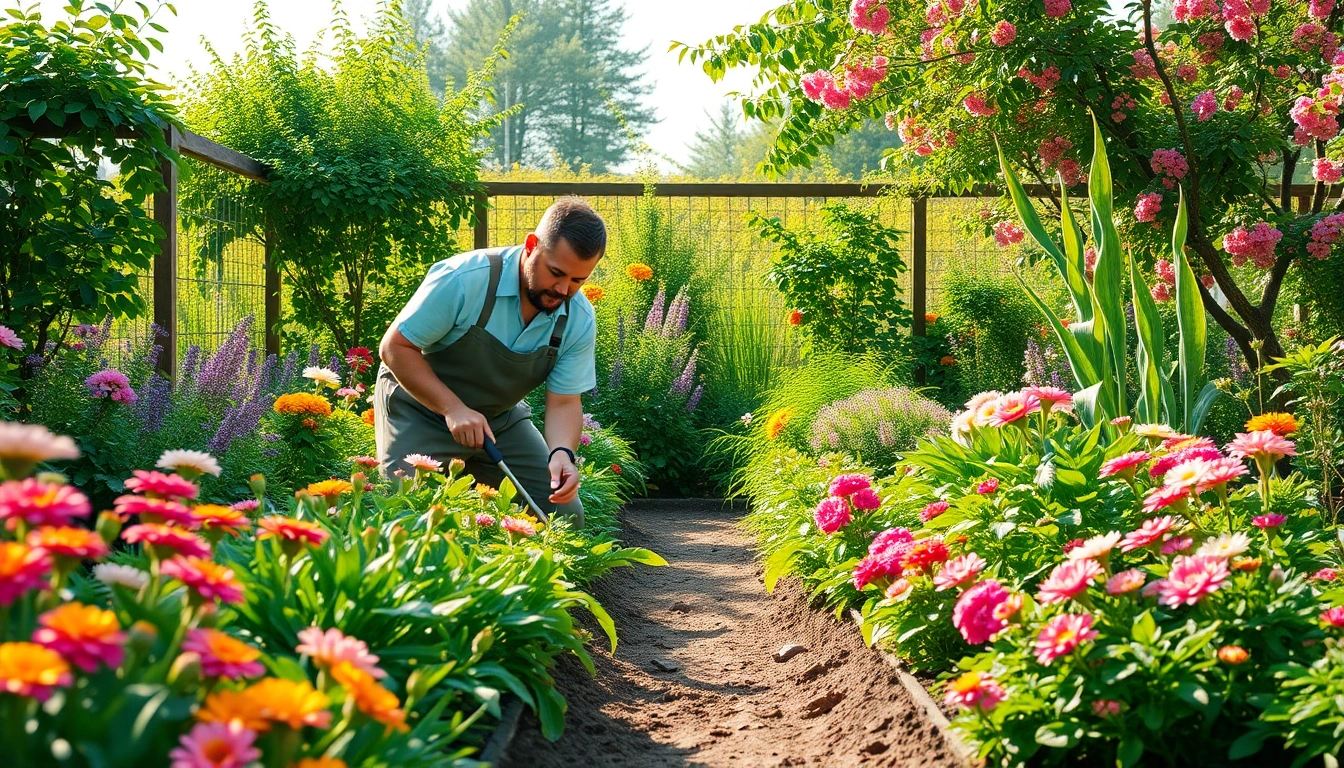Understanding Garden Maintenance Services
What is Garden Maintenance?
Garden maintenance encompasses a variety of tasks aimed at keeping your outdoor space healthy and visually appealing. It involves everything from basic lawn care to more intricate landscaping work, including pruning trees, planting seasonal flowers, and even pest control. Regular maintenance not only enhances the aesthetics but also promotes the overall health of your plants and helps in preserving the environment.
Why Choose Professional Services?
Hiring a garden maintenance service can bring significant benefits over a do-it-yourself approach. Professionals have extensive experience and knowledge that enables them to diagnose issues effectively and implement the best solutions. They are also equipped with the right tools and techniques to perform tasks efficiently. Moreover, by choosing professionals, you free up your time for other important activities while ensuring that your garden receives the attention it needs.
Common Garden Maintenance Tasks
Common tasks involved in garden maintenance include:
- Lawn Care: Regular mowing, aeration, and fertilization.
- Pruning: Trimming overgrown plants and trees to encourage healthy growth.
- Weeding: Removing unwanted plants that compete with your desired flora.
- Fertilization: Applying nutrients to stimulate plant growth.
- Pest Control: Implementing measures to keep harmful insects at bay.
- Irrigation Management: Ensuring proper watering schedules and systems function effectively.
Benefits of Regular Garden Maintenance
Enhancing Curb Appeal
The aesthetic appearance of your garden significantly impacts your home’s curb appeal. Regular maintenance is crucial in ensuring your plants and landscapes look their best year-round. A well-maintained garden not only enhances the overall look of your property but also increases its value. When selling a home, an inviting garden can be a considerable selling point that attracts potential buyers.
Improving Plant Health
Regular maintenance helps identify and address plant health issues before they escalate. For instance, checking for signs of disease or nutrient deficiencies allows you to take corrective measures promptly. Healthy plants are more resilient against pests and diseases, leading to a more vibrant garden.
Time and Cost Efficiency
Many homeowners underestimate the time required for effective garden maintenance until they witness the amount of work involved. By hiring professionals, you ensure that your garden is properly looked after without intruding on your own time. Moreover, performing maintenance tasks incorrectly can lead to costly mistakes, such as planting errors or pest infestations. Therefore, professional services can be a cost-effective approach in the long run.
If You Go DIY: Garden Maintenance Tips
Essential Tools for Homeowners
For those opting for a DIY approach, having the right tools is essential. Here’s a list of must-have garden maintenance tools:
- Lawnmower: For maintaining a neat and tidy lawn.
- Pruning Shears: Essential for shaping plants and trees.
- Shovels and Rakes: Necessary for soil preparation and cleanup.
- Hoe: Useful for weeding and breaking up soil.
- Gardening Gloves: To protect your hands while working.
- Irrigation System: To efficiently water your garden.
Basic Maintenance Techniques
While garden maintenance can seem daunting, adopting a few basic techniques can make a significant difference:
- Regularly Water: Depending on plant needs, establish a consistent watering schedule.
- Mulching: Mulch helps retain moisture, suppress weeds, and improve soil health.
- Deadheading: Remove faded flowers to encourage new blooms and prolong flowering periods.
- Soil Testing: Test soil periodically to monitor pH and nutrient levels for optimal plant growth.
Seasonal Care Guidelines
Different seasons require varying maintenance strategies. Here’s a brief overview of necessary tasks for each season:
- Spring: Begin preparing your garden by cleaning out debris, testing soil, and planting new seeds or plants.
- Summer: Focus on watering, weeding, and fertilizing to maintain healthy growth.
- Fall: A critical time for cleanup; do autumn pruning and prepare plants for winter.
- Winter: Protect your garden by covering delicate plants and planning for spring.
Selecting the Right Garden Maintenance Service
Key Factors to Consider
Selecting the right maintenance service is crucial to ensuring effective garden upkeep. Consider the following factors:
- Experience: Check for years in operation and the expertise of staff.
- Services Offered: Ensure they provide a comprehensive range of services to suit your needs.
- Insurance: Verify that they have liability insurance to cover any potential damages during service.
- Local Knowledge: A service familiar with your local climate and soil conditions can offer insights that enhance care.
Reading Reviews and Testimonials
Customer reviews play an essential role in gauging the quality of a service. Look for positive feedback on platforms such as Yelp and Google Reviews. Testimonials provide insights into the service quality and dependability of the provider. Also, ask your neighbors or friends for recommendations based on their experiences.
Understanding Service Costs
Costs for garden maintenance services can vary based on the scope of services rendered and geographical location. On average, hiring a gardener may range from $150 to $300 per visit, depending on the tasks involved. It’s advisable to get quotes from multiple services and compare what each offers in terms of cost and value.
Frequently Asked Questions About Garden Maintenance
How Much Does a Garden Maintenance Service Cost?
The cost of hiring a garden maintenance service can vary significantly based on location, specific services required, and frequency of visits. On average, homeowners can expect to pay between $150 and $300 per visit. Some companies offer bundled pricing for regular maintenance which can provide substantial savings over time.
What Do Garden Maintenance Services Include?
Most garden maintenance services offer a wide range of options tailored to clients’ needs, including lawn mowing, pruning, weeding, mulching, fertilization, and pest control. Comprehensive services may also include irrigation system maintenance and seasonal planting updates.
How Often Should You Schedule Maintenance?
The frequency of maintenance largely depends on the size of your garden and the types of plants present. For most homeowners, a bi-weekly schedule during the growing season is effective. However, those with larger or more complicated landscapes may require weekly visits. It’s best to consult with your gardening service to determine a schedule tailor-suited to your garden’s needs.



